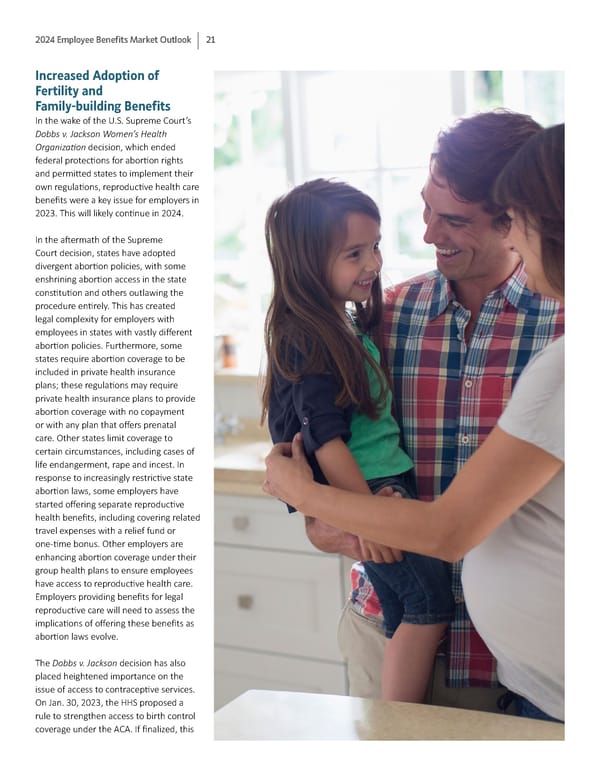2024 Employee Benefits Market Outlook 21 Increased Adoption of Fertility and Family-building Benefits In the wake of the U.S. Supreme Court’s Dobbs v. Jackson Women’s Health Organiza琀椀on decision, which ended federal protec琀椀ons for abor琀椀on rights and permi琀琀ed states to implement their own regula琀椀ons, reproduc琀椀ve health care bene昀椀ts were a key issue for employers in 2023. This will likely con琀椀nue in 2024. In the a昀琀ermath of the Supreme Court decision, states have adopted divergent abor琀椀on policies, with some enshrining abor琀椀on access in the state cons琀椀tu琀椀on and others outlawing the procedure en琀椀rely. This has created legal complexity for employers with employees in states with vastly di昀昀erent abor琀椀on policies. Furthermore, some states require abor琀椀on coverage to be included in private health insurance plans; these regula琀椀ons may require private health insurance plans to provide abor琀椀on coverage with no copayment or with any plan that o昀昀ers prenatal care. Other states limit coverage to certain circumstances, including cases of life endangerment, rape and incest. In response to increasingly restric琀椀ve state abor琀椀on laws, some employers have started o昀昀ering separate reproduc琀椀ve health bene昀椀ts, including covering related travel expenses with a relief fund or one-琀椀me bonus. Other employers are enhancing abor琀椀on coverage under their group health plans to ensure employees have access to reproduc琀椀ve health care. Employers providing bene昀椀ts for legal reproduc琀椀ve care will need to assess the implica琀椀ons of o昀昀ering these bene昀椀ts as abor琀椀on laws evolve. The Dobbs v. Jackson decision has also placed heightened importance on the issue of access to contracep琀椀ve services. On Jan. 30, 2023, the HHS proposed a rule to strengthen access to birth control coverage under the ACA. If 昀椀nalized, this
 2024 Employee Benefits Market Outlook Page 20 Page 22
2024 Employee Benefits Market Outlook Page 20 Page 22